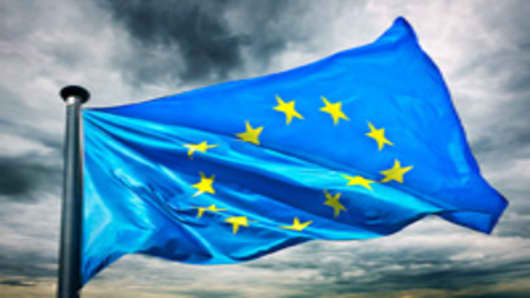European shares were called to open lower on Tuesday after Cyprus said it urgently needed European financial aid to shore up its banking system, a step that would make it the fifth euro zone economy to seek help.
The FTSE was called to open 13 points lower at 5419, the DAX was expected to open 31 points lower at 6110 and the CAC 40 was see opening 16 points lower at 3027.
The move came as Italian bond yields inched up on Monday, raising concerns that markets were turning their gaze in the direction of the Italian economy, judged to be the next sick man of Europe, following the announcement of a bailout loan for Spain over the weekend.
The Wall Street Journal reported that the size of any bailout for Cyprus would amount to no more than 3 to 4 billion euros ($3.8 to $5 billion)—a relatively small amount that wouldn’t place serious strain on Europe.
But Cyprus's request on Monday couldsend a further signal that the feared contagion was continuing to spread through the euro zone. Greece, Ireland and Portugal are already in bailout programs.
The European Union hasn't received a request from Cyprus for help with recapitalizing its banks, but it is ready to act if one were to be made, a spokesman for the European Commission said later on Monday. Earlier Cyprus's finance minister, Vasos Shiarly, said the country's need for an international bailout stemming from a looming bank-recapitalization plan was "exceptionally urgent" and would need to be resolved within a matter of days.
Spain itself was urged to review its plan to create a band bank for its toxic property market assets by the European Central Bank (ECB) on Monday which suggested the current proposals may not go far enough.
As part of a new bank clean-up plan, the Spanish government last month told local banks to set aside additional funds to protect against losses and to transfer troubled property assets from their own balance sheets to external vehicles.
The government wants the banks to recognize losses associated with such assets and place them in the hands of professional property managers to speed their liquidation.
“It remains unclear...whether the envisaged framework is sufficient to achieve an effective separation of the risks of banks," the ECB said in an opinion concerning Spain's reforms.
Adding to Spain’s problems, Fitch Ratings cut the long-term credit ratings for Spanish banks Banco Santander and Banco Bilbao Vizcaya Argentaria to BBB-plus from A. The rating announcement followed the three-notch cut to the country's sovereign rating last week by Fitch last week. The ratings agency also put both Santander and BBVA on a negative outlook.
Meanwhile, European finance officials have discussed emergency measures with Greek authorities including limiting the size of withdrawals from ATM machines, imposing border checks and introducing euro zone capital controls as a worst-case scenario should Athens decide to leave the euro.
EU officials told Reuters the discussions were merely part of contingency plans rather than planning for something they expected to happen.
The discussions have taken place in conference calls over the past six weeks, as concerns have grown that a radical-left coalition, Syriza, may win the second election, increasing the risk that Greece could renege on its EU/IMF bailout and move closer to abandoning the currency.
And Ilias Kasidiaris, the Greek far right politician who assaulted two female deputies on live television last week, has announced he plans to sue the victims of his assault.
Kasidiaris claimed he was acting in self defense when he punched Communist party deputy Liana Kanell in the face in the middle of a television debate. Kanell threw a newspaper at the Golden Dawn politician in the immediate aftermath of a confrontation between Kasidiaris and Syriza party deputy Rena Dourou, which ended in Kasidiaris throwing a glass of water at the leftist MP.
Asian markets reversed the previous day's hefty gains on Tuesday as the bailout for Spain's debt-stricken banks failed to convince investors that the spread of the debt crisis in Europe had halted.
Elsewhere, Qantas Airways has asked Macquarie Group to defend it against a possible takeover and find ways to shore up its share price, a source with knowledge of the matter told Reuters, after the carrier lost a third of its value last week because of a profit warning.
The airline recently split its international and domestic businesses so that a new management team could focus on turning around the unprofitable global arm while the domestic unit battles an aggressive expansion by Virgin Australia
Texas Instruments narrowed its forecasts for second-quarter earnings and revenue, but kept its medium-term target ranges intact as demand for its chips held up, despite global economic uncertainties on Monday.
Texas Instruments forecast revenue in a range of $3.28 billion to $3.42 billion. It previously estimated revenue of $3.22 billion to $3.48 billion. It now expects earnings per share in a range of 32 cents to 36 cents. Its previous target was 30 cents to 38 cents.
And the U.S. extended exemptions from tough, new sanctions on Iran's oil trade to seven more economies on Monday, leaving China the last remaining major importer exposed to possible penalties at the end of the month.
The decision came as OPEC said it may need to raise its oil output target when it sets production policy on Thursday for the second half of the year. OPEC is producing about 1.8 million barrels per day (BPD) in excess of its formal output target of 30 million BPD set in December.
"Our analysis suggests that we will need a higher ceiling than currently exists," Saudi Oil Minister Ali al-Naimi said in an interview published on Monday with Gulf Oil Review.


